HomeReviewsUFO 50
UFO 50 review: a pixellated portrait of the 1980s that offers a strange sort of time travelA retroactive reimagining
A retroactive reimagining
Image credit:Rock Paper Shotgun / Mossmouth
Image credit:Rock Paper Shotgun / Mossmouth
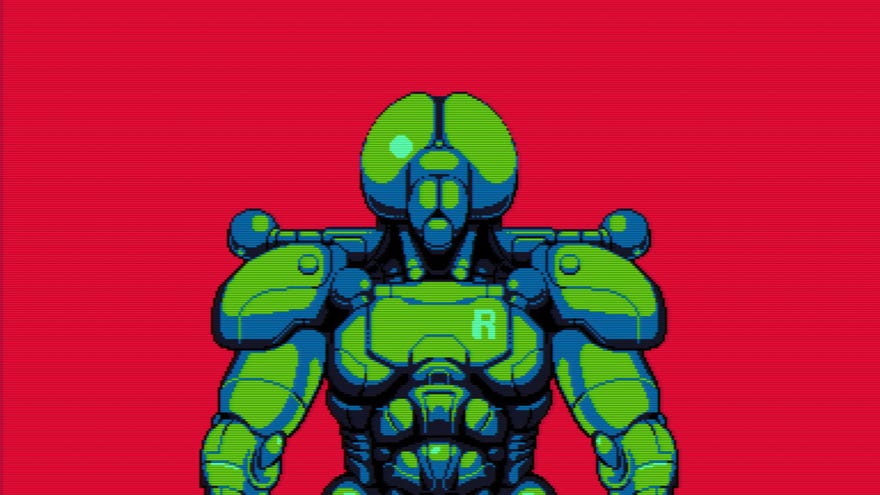
UFO 50 - Announcement TrailerWatch on YouTube
UFO 50 - Announcement Trailer

It’s also a funny collection, full of jokes and pranks at the player’s expense. In one adventure game, tiles may fall on you without warning within seconds of your first movements. In a puzzle game about a chameleon, birds will slurp you up from inside logs just when you thought you understood the rules of camouflage. One medieval strategy game sees your units advance steadily and automatically forward, desperate to charge, unable to even think of defending. This game is called “Attactics”; the title alone a good gag.
There’s also comedy (and satisfaction) in discovering exactly what each of these things is. Barbuta, the “oldest” game in the collection, is an unassuming and ancient homebrew Metroidvania that houses glitchy secrets and requires the patience and dedication of a child indoors on a rainy day to make progress. Rail Heist looks like aSunset Riders-style shooter, but then invites you to play it as an Atari-eraHotline Miami, before you finally realise: “Hang on, is this… an immersive sim!?”
Very few of the games give you any instructions, electing instead to just drop you in. It’s a common complaint that modern games hold your hand too much, that they over-tutorialise, and fail to trust the player’s perseverance or intelligence. So it’s refreshing to get 50 games (albeit of varying depth) which implicitly trust the player to “figure it out”. If your patience or brainpower does run out (and mine did a few times) you can simply eject the cartridge and play something else.
Image credit:Rock Paper Shotgun / Mossmouth
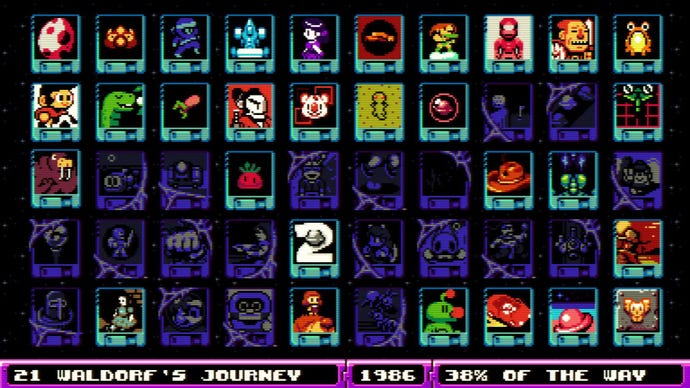
To take an example of one of the more compelling oddities, Mooncat is an comically obtuse platformer with some of the most counter-intuitive controls you will encounter this side of 1985. But if you stop and “zoom out” of your preconceived notions of what a controller’s inputs ought to do, the idea behind it sort of makes sense. All the direction buttons move you left, and all the face buttons move right. Hey, why not? These are games diegetically invented four decades ago, and it’s fun to read Mooncat as the product of a time long before each genre’s control schemes developed any sense of orthodoxy.
Image credit:Rock Paper Shotgun / Mossmouth
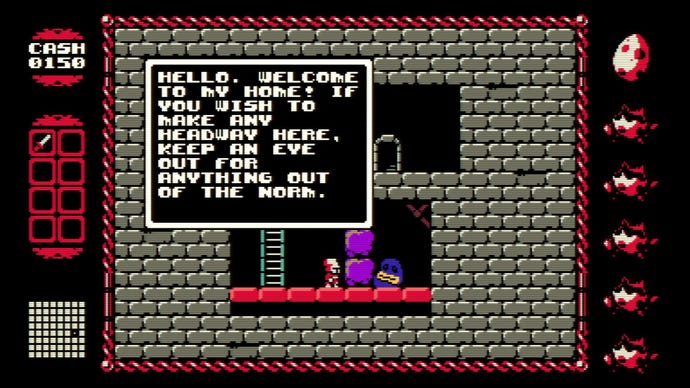
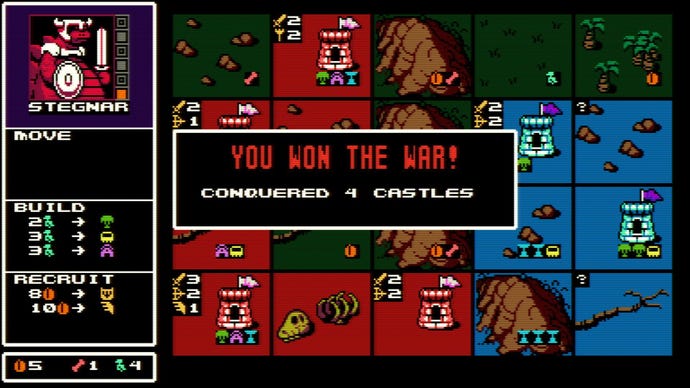
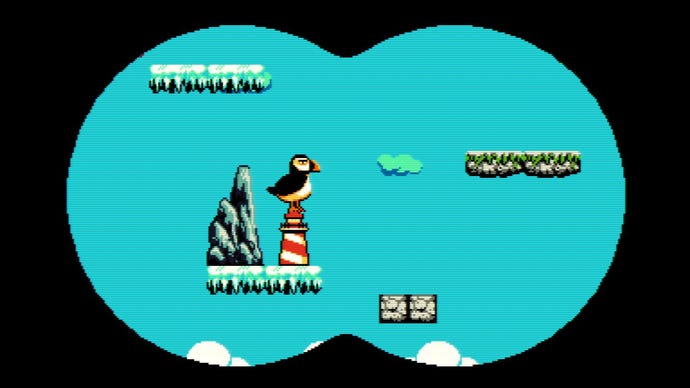
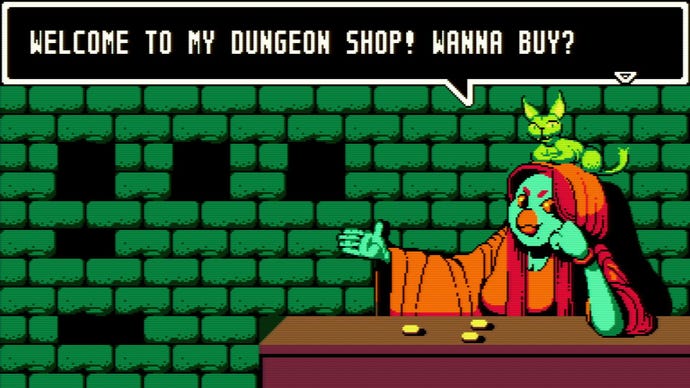
“Our goal,” say this gang, “is to combine a familiar 8-bit aesthetic with new ideas and modern game design.” In this I’d say they succeed. Many of the games are built on design principles or novel gimmicks that simply wouldn’t appear in the shooters and platformers of yore, and it’s interesting to see where the creators draw a line in terms of what constitutes modern and “classic” game design. (They also inadvertantly make a compilation of games that fit the aesthetics of the “indie darlings” era of the 2010s, but probably because, uh, theyarethose darlings).
The modern twists are noticeable. Take the concept of “lives” for example. Mortol is a platformer in which you are given a generous 20 lives. But then you are expected to spend those lives turning yourself to stone blocks, or repeatedly launching yourself at the wall to create a step-ladder out of your rigid corpses, thus helping your next “life” get further into the level. Other modern ideas trickle into the games. You can hold down a button to skip long cinematics, for instance. And at least one game ranks you on a three-star scale at the end of every level, adapting the contemporary practice of mobile games.
Against the aesthetics of a pixelated era, such features feel alien, yet weirdly compelling. Imagine watching Humphrey Bogart send a telegram in a 1950s noir, and then text starts appearing on-screen in a WhatsApp speech bubble. Imagine you are enjoying an Akira Kurosawa flick, and suddenly: an unmistakable drone shot. That’s what playing UFO 50 is like. It’s a compilation of double-takes, a comic provoker of “huh"s, an anachronism bonanza.
Image credit:Rock Paper Shotgun / Mossmouth
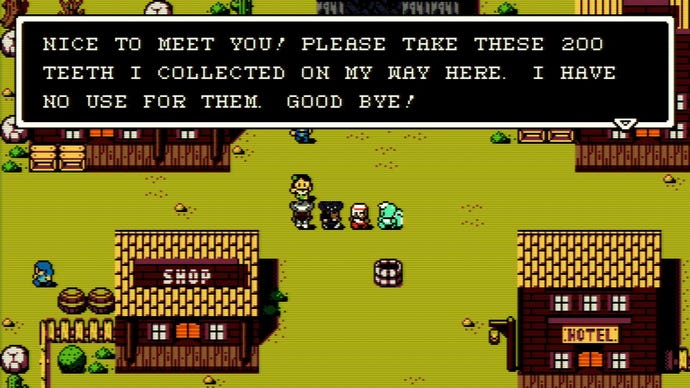
Image credit:Rock Paper Shotgun / Mossmouth
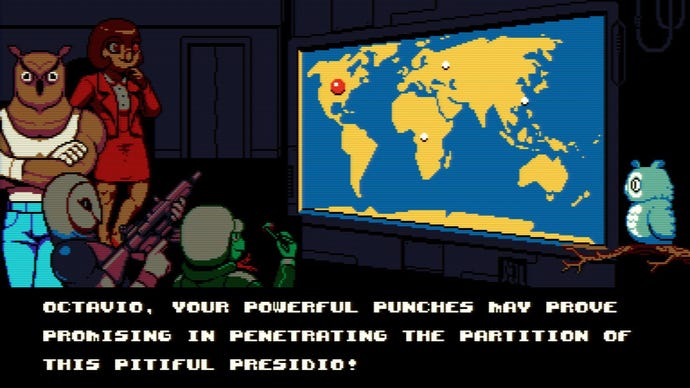
Image credit:Rock Paper Shotgun / Mossmouth
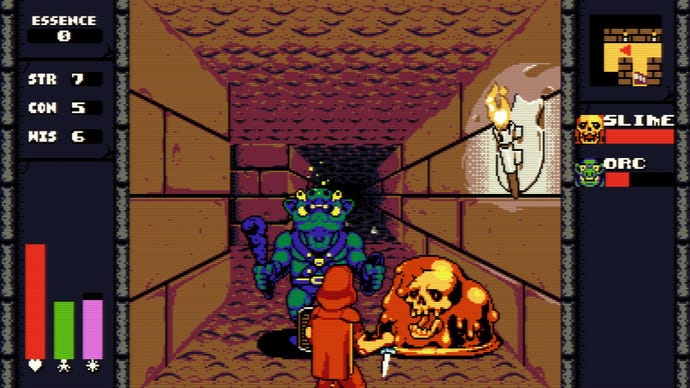
As someone who has spent years curating games to an audience, I’m conflicted about that. It feels a bit like work. I used to trawl through itch.io every week for afree games columnon this very site. I understand both the satisfaction and disinterest that comes from panning for gold dust, even in today’s overwhelming gamepocalypse. It’s definitely gratifying to rummage through UFO 50 and find an Avianos, a Velgress, a Mortol in the pile. But I also didn’t get through all 50 of the games in the collection. I barely scratched half. I don’t think I could face mining the entire bundle. (Fun side note: this isn’t the first time we’ve been at the coal face with50 short games, or even300 in a pirate kart).
Maybe an unfinished pile is to be expected, though. The internet is a capable devourer, and I look forward to reading user reviews about UFO 50 in a way I don’t for many other recent releases. Players will be able to evangelize their favourites, list their unmissables, and get into role-playing flame wars about which game in the Campanella Trilogy was best. Perhaps someone out there will explain why you should not give up on the opaque works of Thorson Petter. That would be swell. I don’t want to complete Mooncat, that baffling platformer, but I do want to watch the 20-minute retrospective from the bearded 50-year-old who has.